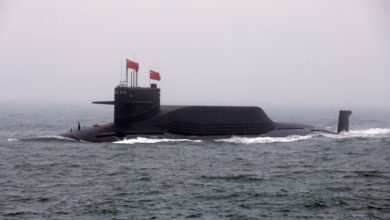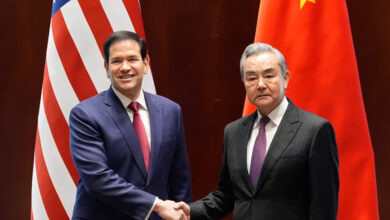
China said on Friday tension over North Korea had to be stopped from reaching an "irreversible and unmanageable stage" as a U.S. aircraft carrier group steamed toward the region amid fears the North may conduct a sixth nuclear weapons test.
Concern has grown since the U.S. Navy fired 59 Tomahawk missiles at a Syrian airfield last week in response to a deadly gas attack, raising questions about U.S. President Donald Trump's plans for North Korea, which has conducted missile and nuclear tests in defiance of U.N. and unilateral sanctions.
The United States has warned that a policy of "strategic patience" is over. U.S. Vice President Mike Pence travels to South Korea on Sunday on a long-planned 10-day trip to Asia.
China, North Korea's sole major ally and neighbor which nevertheless opposes its weapons program, has called for talks leading to the denuclearization of the Korean peninsula.
"We call on all parties to refrain from provoking and threatening each other, whether in words or actions, and not let the situation get to an irreversible and unmanageable stage," Chinese Foreign Minister Wang Yi told reporters in Beijing.
North Korea denounced the United States for bringing "huge nuclear strategic assets" to the region as the Carl Vinson strike group with a flag-ship nuclear-powered aircraft carrier steamed closer, and said it stood ready to strike back.
"The Trump administration, which made a surprise guided cruise-missile strike on Syria on April 6, has entered the path of open threat and blackmail," the North's KCNA news agency quoted the military as saying in a statement.
"The army and people of the DPRK will as ever courageously counter those who encroach upon the dignity and sovereignty of the DPRK and will always mercilessly ravage all provocative options of the U.S. with Korean-style toughest counteraction."
DPRK stands for the North's official name, the Democratic People's Republic of Korea.
North Korea, still technically at war with the South after their 1950-53 conflict ended in a truce, not a treaty, has on occasion conducted missile or nuclear tests to coincide with big political events and often threatens the United States, South Korea and Japan.
On Saturday, it marks the "Day of the Sun", the 105th anniversary of the birth of state founder Kim Il Sung.
U.S. ally South Korea warned against any North Korean "provocation", such as a nuclear or missile test.
"There is certain to be powerful punitive measure that will be difficult for the North Korean regime to endure," the South's Foreign Ministry said in a statement.
WITH OR WITHOUT YOU
While Trump has put North Korea on notice that he will not tolerate any more provocation, U.S. officials have said his administration is focusing its strategy on tougher economic sanctions.
Trump said on Thursday North Korea was a problem that "will be taken care of" and he believed Chinese President Xi Jinping would "work very hard" to help resolve it.
Trump has also said the United States is prepared to tackle the crisis without China, if necessary.
He diverted the Carl Vinson aircraft carrier and its strike group toward the Korean peninsula last weekend in a show of force.
Trump has also been pressing China to do more to rein in North Korea.
China banned all imports of North Korean coal on Feb. 26 under U.N. sanctions, cutting off the North's most important export, and on Friday, Chinese state broadcaster CCTV said national airline Air China was suspending flights to Pyongyang.
It did not say why the flights, which operate on Monday, Wednesday and Friday, were being suspended and Air China could not be reached for comment.
Worry about North Korean aggression has also led to a deterioration of ties between China and South Korea because China objects to the deployment of a U.S. Terminal High Altitude Area Defense (THAAD) anti-missile system in the South.
"It's not hard to see that ever since the United States and Republic of Korea decided to deploy THAAD, the situation has not become harmonious but has become more tense," Chinese Foreign Ministry spokesman Geng Shuang, said in response to a question about the system.
South Korea and the United States say the sole purpose of the THAAD is to guard against North Korean missiles, but China says that its powerful radar could penetrate its territory.
The dollar fell on Friday against a basket of currencies, on track for a losing week as tension over North Korea underpinned the perceived safe-haven Japanese yen.
Japan's Nikkei business daily said the government had discussed how to rescue an estimated 57,000 Japanese citizens in South Korea as well as how to cope with a possible flood of North Korean refugees coming to Japan, among whom might be spies.
In Pyongyang, retired soldier Ho Song Chol told Reuters that North Korea would win should there be any conflict with the United States.
"We don't think about other things, we just live in our belief that we will win as long as our Supreme Leader is with us," Ho said, referring to Kim Jong Un.
Kang Gil-won, a 26-year-old graduate living in Seoul, said his biggest concern was not North Korea, but finding work in a tough job market.
"There’s no concern that war is going to break out tomorrow," he told Reuters at a "study café" where many job seekers prepare for interviews. Getting a job is a war that I feel in my bones."
Report by Dominique Patton and Sue-Lin Wong (Beijing/Pyongyang); Additional reporting by Nick Macfie, James Pearson, Ju-min Park and Jack Kim in SEOUL, Natalie Thomas in Pyongyang, Linda Sieg in TOKYO and Michael Martina and Christian Shepherd in BEIJING; Writing by Nick Macfie; Editing by Robert Birsel; Reuters




